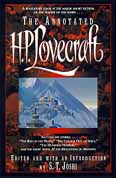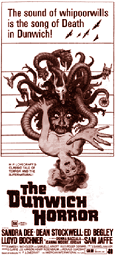
 |
|
|
|
 |
| Young H.P. looks towards the unutterable evil beyond mankind's feeble understanding of the universe. |
During the 1920's-30's, horror/pulp author H.P. Lovecraft crafted gazillions of short stories as well as several novels. Unknowingly, he was creating the blueprints for much of horror to come - his influence is readily felt in authors such as Steven King and Clive Barker as well as filmmakers like John Carpenter and Sam Raimi. Many of his stories have been translated to film, including Stuart Gordon's highly entertaining Re-Animator and From Beyond, as well as several - ahem - less worthwhile ventures. And no-one knows H.P better than S.T. Joshi. He authored the definitive biography of Lovecraft - H.P. Lovecraft: A Life - as well as contributing to Dell's annotated version of Lovecraft's work: The Annotated H.P. Lovecraft and More Annotated H.P. Lovecraft.
Not satisfied with his efforts so far, S.T. continues his work in relation to pulp/horror authors of the era via Hippocampus Press, a small press dedicated to releasing further Lovecraftian studies as well as works by lesser known writers.
S.T. stopped by the virtual Acid Logic offices to muse on all things dark, mysterious and as H.P. might put it, utterly incomprehensible to the limited power of the human mind.
Why Lovecraft? Why has he survived past so many of his pulp contemporaries?
It would be nice to think that Lovecraft has "survived" purely, or even largely, as a result of the plain fact that he is simply better (literally, intellectually, philosophically) than his pulp contemporaries; but history is full of instances where meritorious authors have lapsed into oblivion or have become merely the focus of a small coterie of readers, while more mediocre writers continue to gain a wide readership. So there must be more to it than that. In some senses, Lovecraft's work is timeless--not dependent upon an awareness of the social-culture milieu in which it was written. Its focus on the cosmic makes it readily comprehensible in a way that other work of the 1920s and 1930s is not. But I think the chief element here is Lovecraft's tremendously potent and bizarre imagination. It is this that initially fascinates readers in their teenage years; only later do some readers go on to perceive the intellectual substance behind the imaginative force of Lovecraft's work.
When you first read the Lovecraft stories they seem cliché. They are repeating the same sorts of plots and situations we've seen in horror films and novels for years. But then you realize that Lovecraft's works are the originators of these concepts, like the ectoplasmic energy shooting into the sky in "The Shunned House" or the comical zombies of "Herbert West, Re-Animator."
I'm sure much could be written on the covert influence of Lovecraft on films from as early as the 1940s, and some of this influence may well be indirect--i.e., filtered through the authors Lovecraft himself influenced (Robert Bloch, August Derleth, Henry Kuttner, C. L. Moore, all the way down to Philip K. Dick, Stephen King, and Clive Barker). In another sense, Lovecraft simply touches upon such fundamental issues in horror literature--the reanimation of the dead, the mingled wonder and terror of the unbounded universe, mankind's precarious tenure on this planet--that it is not surprising that both horror and science fiction films continue to draw on his work and his ideas.
 I'd
read a lot of Lovecraft in the past, but reading your annotated version
was a difference of night and day. I'd go as far as to say that I was
only understanding about half of what I was reading in non-annotated form.
How do you go about finding the information to document the annotations?
That would seem like a giant task unto itself.
I'd
read a lot of Lovecraft in the past, but reading your annotated version
was a difference of night and day. I'd go as far as to say that I was
only understanding about half of what I was reading in non-annotated form.
How do you go about finding the information to document the annotations?
That would seem like a giant task unto itself.
Lovecraft actually makes annotating his stories very easy, because he himself provides so many clues as to the sources or inspirations of his tales or of specific elements in his tales. If he had not left behind those thousands of letters in which he talks about everything under the sun--ranging from his adventures in buying a suit in Brooklyn to his taste in doughnuts to his reading of Nietzsche to his support for FDR--it would be difficult indeed to trace the "story behind the story" of his fiction.
What kind of doughnuts did Lovecraft enjoy?
Lovecraft has at least one very learned disquisition on doughnuts--see p. 3 of SELECTED LETTERS, Vol. 4. There he compares the doughnuts at his local A & P with those to be obtained at some grocery in Clearwater, Fla., called the Piggly-Wiggly (!!!). I also remember a discussion about cookies, whereby he expresses his preference for something called Zu-Zus (made by the National Biscuit Co. = Nabisco) over Yum-Yums. It all sounds like a Gilbert & Sullivan bit, but it's true.
There's a lot of argument that Lovecraft was a xenophobe and a racist. (Certainly his description of the black zombie in "Herbert West, Re-Animator" seems unduly disparaging.) Is this simply a situation where you have to judge an author according to the mores of his own time? How do you bypass this on personal level?
As an Indian, I am perennially entertained by Lovecraft's comment, in the 1930s, that "The more one thinks about India, the more one wants to vomit!" (Actually, he was referring to the political turmoil initiated by Gandhi's quest for independence from Great Britain.) There is no denying the reality of Lovecraft's racism, nor can it merely be passed off as "typical of his time," for it appears that Lovecraft expressed his views more pronouncedly (although usually not for publication) than many others of his era. It is also foolish to deny that racism enters into his fiction at key points (although I might suggest that there is a considerable element of humour and parody in that passage you cite in "Herbert West"). I find Lovecraft's racism disappointing not merely because he expressed it so frequently in fiction and letters, but because this was one area where he refused to modify his thinking in light of new evidence. In every other aspect of his thought--metaphysics, politics, economics, aesthetics--he was constantly amending his views as new information came to him; but with his racism, he stuck pretty much to the prejudices he had absorbed in the reactionary New England of the 1890s.
At the root of the Cthulhu mythos* is the concept that man is an insignificant speck in a universe beyond his comprehension. Did Lovecraft ever run afoul of the proponents of other religions who saw his work as blasphemous?
Lovecraft constantly engaged in (more or less) genial debates on religion with several colleagues, notably the pious writer and teacher Maurice W. Moe. Lovecraft made no bones about being a complete atheist, and he considered religion not merely false but dangerous to social and political progress. But in his own lifetime I don't recall an instance where anyone took his work to be "blasphemous." A decade or two ago a Catholic scholar made this argument, but no one took him very seriously.
You argue, like a lot of people, that there's never been a really faithful film adaptation of Lovecraft's stories. Why do you think this is so? Does Lovecraft's work have to be "dumbed down" for the public?
 So
much of the power and effectiveness of Lovecraft's work depends on words:
in many ways his stories are not plain narratives, but a kind of incantation
where he seeks to create a mesmerizing atmosphere of horror and awe through
the spell of language. Naturally, this cannot be captured on screen--or,
rather, it must be captured in a different way. So far, it does not appear
as if any director has been up to the task of capturing the Lovecraftian
atmosphere--although that doesn't mean that no one will be able
to do so in the future. But what it will take is vision and subtlety--two
qualities that appear to be in short supply in Hollywood, with its need
for conventionalized, "happy ending" plots with plenty of sentimental
melodrama and plenty of "special effects." It is not merely that Lovecraft's
work has to be "dumbed down"; all Hollywood films must be dumbed
down in order to attract a mass audience, since the masses are, I regret
to say, pretty dumb. So the "independent" director is probably our only
hope. I can imagine a Lovecraft film in which the "monster," although
constantly hovering in the background, never appears on screen.
That, to my mind, would be one way of conveying a truly "Lovecraftian"
atmosphere.
So
much of the power and effectiveness of Lovecraft's work depends on words:
in many ways his stories are not plain narratives, but a kind of incantation
where he seeks to create a mesmerizing atmosphere of horror and awe through
the spell of language. Naturally, this cannot be captured on screen--or,
rather, it must be captured in a different way. So far, it does not appear
as if any director has been up to the task of capturing the Lovecraftian
atmosphere--although that doesn't mean that no one will be able
to do so in the future. But what it will take is vision and subtlety--two
qualities that appear to be in short supply in Hollywood, with its need
for conventionalized, "happy ending" plots with plenty of sentimental
melodrama and plenty of "special effects." It is not merely that Lovecraft's
work has to be "dumbed down"; all Hollywood films must be dumbed
down in order to attract a mass audience, since the masses are, I regret
to say, pretty dumb. So the "independent" director is probably our only
hope. I can imagine a Lovecraft film in which the "monster," although
constantly hovering in the background, never appears on screen.
That, to my mind, would be one way of conveying a truly "Lovecraftian"
atmosphere.
You're currently doing a lot of work with Hippocampus Press, reprinting some of the science fiction and horror works from the era of Lovecraft. What are your goals there?
I have several goals with Hippocampus Press, and so far they are all being met splendidly. Firstly, we need a press that can issue affordable books embodying cutting-edge scholarship that will be of interest to Lovecraftians; such books could not be published commercially, because there is not a sufficiently large demand for them. Secondly, a selection of the works that influenced Lovecraft need to be made available, so that people can see how Lovecraft came to be the writer that he was. Thirdly, the work of Lovecraft's contemporaries (Clark Ashton Smith, R. H. Barlow, and others) is oftentimes neglected, and we hope to bring this work to readers' attention so they can envision Lovecraft as the nexus of a dynamic literary community of the 1920s and 1930s that produced some of the most distinctive horror and fantasy work in all literary history. But, as I say, many such works are not commercially viable, so a small press like Hippocampus fills a real need.
*The Cthulhu Mythos are the collected works based on Lovecraft's stories about a race of multi-dimensional beings whose power and potential for evil is "incomprehensible." (As are many things in Lovecraft's world.)
Click here for an interview with Lovecraftian filmmaker Stuart Gordon!
HOME
- LINKS - SEARCH
- BUY!!!
Columns - Features
- Interviews - Fiction
- Acid Radio - GuestBook Sign/View
- Blogs
View ForbistheMighty.com for more
sin and wackiness!
Email Publisher